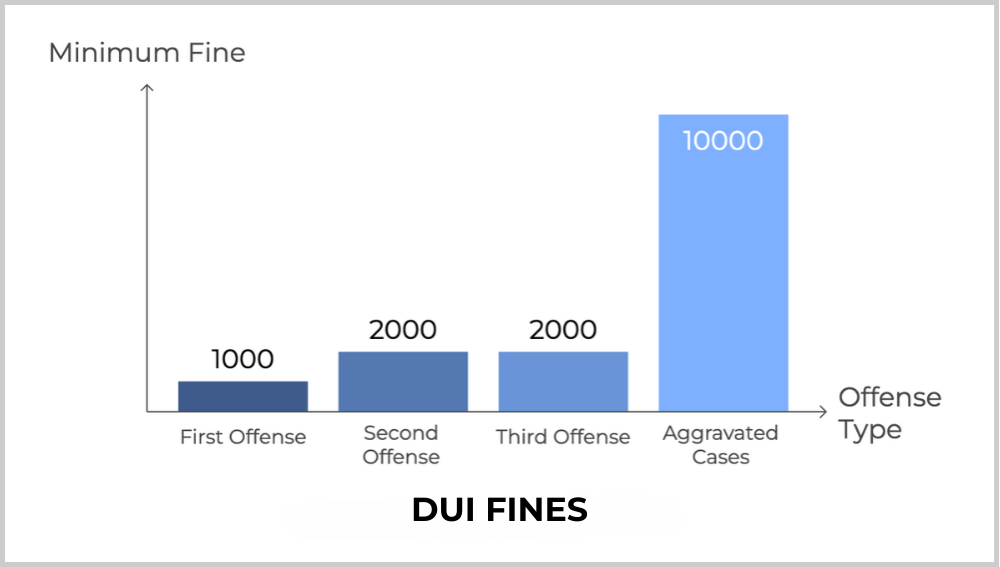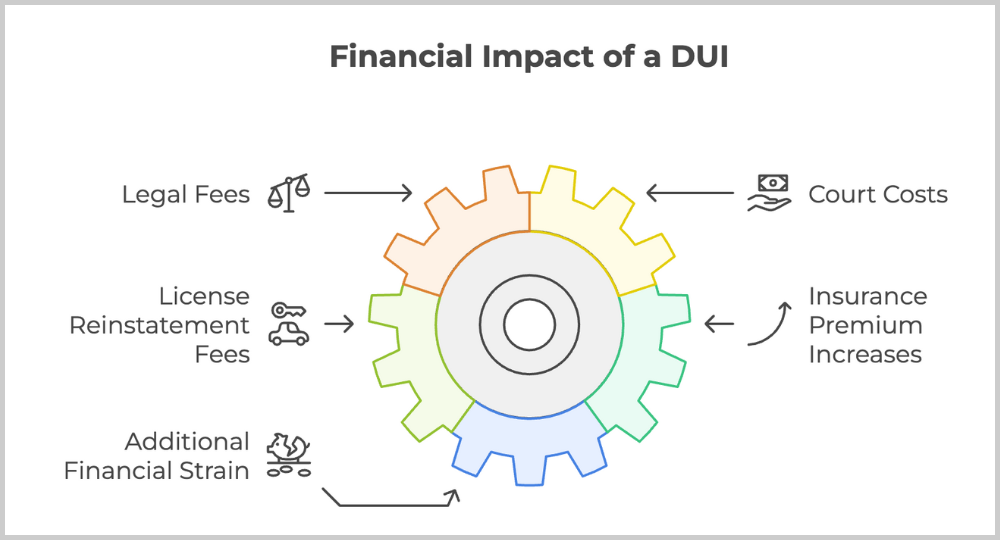DUI Fines: How Much Does A DUI Cost?
Last Updated: November 8, 2024
When considering the question, “How much does a DUI cost?”, it’s crucial to look beyond the initial penalties imposed by the court.
The financial repercussions include immediate costs such as legal fees, which can run into thousands of dollars, court-mandated programs, and potential vehicle impoundment expenses. However, the long-term expenses often prove to be even more significant.
These long-term costs can include dramatically increased insurance premiums, which can last for years after the conviction. In some cases, insurance rates can increase by 100% or more, resulting in thousands of dollars in additional expenses over time.
Other ongoing costs may include fees associated with license reinstatement, mandatory ignition interlock devices, and continuing alcohol education or treatment programs.
Moreover, the indirect financial impacts of a DUI can be equally severe. Lost wages due to court appearances, potential job loss or difficulty finding employment with a DUI on record, and restrictions on international travel that may affect business opportunities all contribute to the overall financial toll.
For some professions, a DUI conviction can lead to the loss of professional licenses or certifications, further compounding the economic impact.
In the following sections, we’ll offer a DUI fines and penalties breakdown, providing a clear picture of the immediate, short-term, and long-term financial implications of this serious offense.
Breakdown of Typical DUI Fines

In Canada, the fines and penalties for Driving Under the Influence (DUI) offenses are structured to escalate with repeat offenses and aggravating factors. This tiered system is designed to deter repeat offenses and reflect the increased risk associated with habitual impaired driving.
For a First Offense, the Criminal Code of Canada mandates a minimum fine of $1,000. However, the actual fine imposed can be significantly higher, depending on the specific circumstances of the case and the province in which the offense occurred.
In addition to the fine, first-time offenders typically face a mandatory driving prohibition for a minimum of one year, though this period can be reduced if the offender agrees to participate in an ignition interlock program. It’s important to note that these are federal minimums, and provinces may impose additional penalties. For example, in Ontario, first-time offenders may also face a 90-day Administrative Driver’s License Suspension (ADLS) and mandatory participation in education or treatment programs.
Second and Subsequent Offenses carry significantly harsher penalties, reflecting the gravity of repeat impaired driving. For a second offense, the Criminal Code mandates a minimum fine of $2,000 and a mandatory minimum imprisonment of 30 days. The driving prohibition also increases to a minimum of two years up to a maximum of 10 years.
For a third or subsequent offense, the minimum fine remains at $2,000, but the mandatory minimum imprisonment increases to 120 days. These offenders also face a minimum driving prohibition of three years, with the possibility of an indefinite prohibition at the discretion of the court. It’s crucial to understand that these are minimum penalties, and courts often impose more severe sanctions for repeat offenders.
Aggravated DUI cases, which include situations involving extremely high Blood Alcohol Concentration (BAC) levels, accidents resulting in bodily harm or death, or driving with children in the vehicle, face even steeper penalties. While the Criminal Code doesn’t specify higher fines for these circumstances, courts typically impose fines well above the minimum, often reaching tens of thousands of dollars.
In cases involving bodily harm or death, offenders can face up to 10 years or life imprisonment, respectively. Additionally, many provinces have implemented escalating administrative penalties for high BAC levels. For instance, in British Columbia, drivers with a BAC of 0.16 or higher face longer driving prohibitions and vehicle impoundment periods compared to those with lower BAC levels.
It’s important to note that these fines and penalties represent only the direct legal consequences of a DUI conviction. The total financial impact often includes additional costs such as legal fees, increased insurance premiums, and expenses related to mandatory education or treatment programs.
Furthermore, some provinces have implemented administrative monetary penalties in addition to criminal fines. For example, Alberta’s SafeRoads program imposes immediate administrative penalties, including fines and vehicle seizures, which are separate from and in addition to any criminal penalties that may be imposed.
Additional Costs Beyond Fines

The financial impact of a DUI in Canada extends far beyond the initial fines imposed by the court. These additional costs can significantly increase the overall financial burden of a DUI conviction and often catch many offenders off guard.
Legal Fees represent one of the most substantial additional costs associated with a DUI charge. Hiring a DUI lawyer is often necessary to navigate the complex legal system and potentially mitigate the consequences of the charge. In Canada, the cost of hiring a DUI lawyer can range from $10,000 to $15,000, depending on the complexity of the case and the lawyer’s experience.
More complex cases, such as those involving accidents or injuries, can lead to even higher legal fees. It’s important to note that while these costs are significant, experienced legal representation can potentially save money in the long run by reducing fines, penalties, or even securing an acquittal in some cases.
Court Costs and Administrative Fees add another layer of expense to DUI charges. These can include fees for filing court documents, costs associated with obtaining court transcripts, and expenses related to mandatory programs ordered by the court. For instance, many provinces require DUI offenders to complete alcohol education or treatment programs, which can cost several hundred to over a thousand dollars.
In Ontario, the Back on Track program, which is mandatory for all convicted impaired drivers, costs $634. Additionally, there may be fees associated with probation supervision or community service programs if these are part of the sentence.
License Reinstatement Fees can be substantial and vary by province. After a DUI conviction, drivers must typically pay fees to have their license reinstated once the suspension period ends. For example, in Ontario, the license reinstatement fee is $198. However, this basic fee is often just the beginning.
Many provinces require DUI offenders to install an ignition interlock device in their vehicle as a condition of license reinstatement. The costs associated with these devices, including installation, monthly rental fees, and maintenance, can add up to several thousand dollars over the course of the program, which typically lasts at least one year.
Insurance Premium Increases often represent the most significant long-term financial consequence of a DUI conviction. In Canada, a DUI conviction can lead to insurance premium increases ranging from 50% to 300%, depending on the insurance company and the specific circumstances of the case. For many drivers, this can mean paying thousands of dollars more per year for auto insurance.
These increased rates typically last for at least three years, but can affect premiums for up to ten years in some cases. In extreme situations, some drivers may find themselves uninsurable through standard insurance companies and may need to seek high-risk insurance, which comes with significantly higher premiums.
It’s also worth noting that these additional costs can have cascading effects on an individual’s financial situation. The combination of fines, legal fees, increased insurance premiums, and other expenses can lead to significant financial strain, potentially affecting credit scores, savings, and overall financial stability.

Mandatory Programs and Related Expenses
Following a DUI conviction in Canada, offenders are often required to participate in various mandatory programs and bear additional expenses related to their conviction. These programs and expenses are designed to promote rehabilitation, ensure public safety, and serve as deterrents against future offenses.
Alcohol Education and Rehabilitation Programs are commonly mandated for DUI offenders across Canada. These programs vary by province but generally aim to educate participants about the dangers of impaired driving and help them develop strategies to prevent future offenses. Ignition Interlock Device Installation is another common requirement for DUI offenders seeking to regain their driving privileges. This device requires the driver to provide a breath sample before the vehicle can start, effectively preventing operation by an impaired individual.
The costs associated with ignition interlock devices can be substantial. In Canada, the average installation fee ranges from $100 to $200. Additionally, there are monthly rental and maintenance fees that typically range from $100 to $150 per month.
Considering that most provinces require the device to be installed for a minimum of one year (and often longer for repeat offenders), the total cost can easily exceed $2,000.
Vehicle Impoundment and Towing expenses can add a significant financial burden to DUI offenders. In many provinces, vehicles driven by impaired drivers are subject to immediate impoundment. The costs associated with this include towing fees and daily storage rates at impound lots.
Towing fees typically range from $100 to $400, depending on the distance and time of day. Daily storage rates at impound lots can vary widely but often range from $20 to $80 per day. Given that impoundment periods can last from 3 to 30 days or more, depending on the province and the specifics of the offense, these costs can quickly accumulate. For example, in British Columbia, a 30-day impoundment could cost upwards of $700 in storage fees alone, not including towing charges.
The cumulative effect of these mandatory programs and related expenses can be substantial. When combined with fines, legal fees, and increased insurance premiums, they contribute to the overwhelming financial burden that DUI offenders face. This financial strain serves as a powerful deterrent and underscores the serious consequences of impaired driving in Canada.

Long-Term Financial Consequences of a DUI
The long-term financial consequences of a DUI conviction in Canada can be severe and far-reaching. Employment and income can be significantly impacted, with potential job loss due to inability to drive or criminal record checks.
Many industries, particularly those involving driving or working with vulnerable populations, may restrict employment opportunities for individuals with DUI convictions. Professional licenses in fields such as healthcare, law, and education can be suspended or revoked, further limiting career prospects and earning potential.
Moreover, the financial burden extends to insurance rates, with DUI offenders often designated as high-risk drivers for 3-5 years or more. This designation can result in insurance premiums increasing by 100% to 300%, costing thousands of dollars extra annually. These elevated rates, combined with potential income loss and limited job opportunities, can create a long-lasting financial strain that persists well beyond the initial conviction, affecting an individual’s financial stability for years to come.
Strategies to Minimize DUI Costs
Minimizing the costs associated with a DUI charge in Canada requires a strategic approach. Hiring an experienced DUI lawyer is often the most effective first step. A skilled attorney can potentially reduce fines, negotiate lesser charges, or even secure an acquittal in some cases.
They can explore plea bargains, such as reducing a DUI charge to “reckless driving,” which typically carries less severe penalties and long-term consequences. Lawyers can also advocate for alternative sentencing options that may be less financially burdensome. Additionally, some jurisdictions offer diversion programs for first-time offenders, which, if successfully completed, can result in reduced or eliminated penalties.
These programs often include education and rehabilitation components and may lead to charges being withdrawn or stayed. Participating in such programs can significantly mitigate the long-term financial impact of a DUI charge. While these strategies may involve upfront costs, they can potentially save substantial amounts in the long run by reducing fines, penalties, and insurance increases.
Final Thoughts
The financial impact of a DUI charge in Canada extends far beyond initial fines, encompassing legal fees, mandatory programs, insurance hikes, and potential career impacts. These expenses can easily total tens of thousands of dollars over several years, creating a significant and long-lasting financial burden. Given the severe consequences, investing in experienced legal representation is crucial. A skilled DUI lawyer can potentially reduce charges, negotiate plea bargains, or explore alternative sentencing options, potentially saving substantial amounts in the long run. While the costs of a DUI are severe, proper legal guidance can help mitigate these expenses and protect one’s financial future.
Get A Free Consultation
"*" indicates required fields



